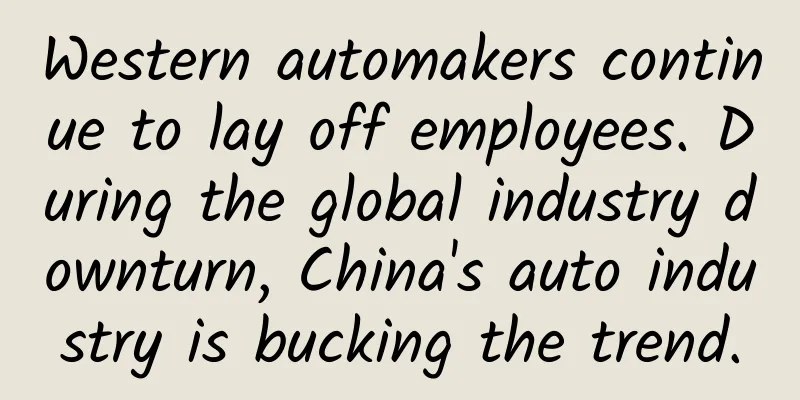Western automakers continue to lay off employees. During the global industry downturn, China's auto industry is bucking the trend.

|
The sun rises in the east and it rains in the west. In the new energy era, the auto parts industries in the East and the West are heading in opposite directions, but this time, it is the traditional Western companies that are under greater pressure. Not long ago, German auto parts supplier Bosch planned to lay off 1,200 employees in its software and electronics departments in the next three years to cope with rising costs and slowing growth. Bosch said that economic weakness and high inflation have led to a sharp increase in energy and material expenses, and the company will consider further cost reductions in its "cross-domain computing solutions division", which is responsible for developing autonomous driving technology. Bosch said that the business "faces greater challenges than expected" and the company has already started negotiations with employee representatives. In recent times, many German automakers have encountered difficulties. Slowing demand and rising costs have led automakers to cut production, and the production cuts of automakers will also have an impact on parts suppliers such as Bosch, Continental and ZF. Previously, another supplier, ZF, also said it was considering closing two factories in Germany and expected to cut 12,000 jobs by 2030, transferring some functional departments to Eastern European countries or India where employment costs are lower. Continental, also from Germany, also said at the end of last year that it was considering selling its assets and cutting thousands of employees to increase the competitiveness of its automotive business unit. According to reports, Continental plans to lay off about 5,500 people in its troubled automotive business unit, with thousands of jobs coming from Germany. Stefan Bratzel, director of the Center for Automotive Management (CAM) in Bergisch Gladbach, said he was "not surprised" by the news of supplier layoffs because the consequences of the industry's rapid transformation are only now becoming apparent. "I'm afraid this is just the beginning," he said. "By 2030, we expect a 20% reduction in the number of employees at German carmakers and suppliers." Frank Schwope, lecturer in automotive economics at FHM in Hanover, also believes that German automotive suppliers will continue to cut jobs. In addition to the above three suppliers, some other suppliers also laid off employees last year. In August, Freya closed a seat factory and laid off 511 employees; in October, chip manufacturer ON Semiconductor expected its performance in the fourth quarter to decline and planned to lay off about 900 employees. In addition to suppliers, car companies have also started to lay off employees. In February, Ford announced it would cut 3,800 jobs in Europe, and at the end of October it announced it would cut another 364 jobs. In October, General Motors announced that it would lay off employees in several factories due to the UAW strike, bringing the total number of employees laid off due to the strike to more than 2,300. In 2023, Stellantis Group announced layoffs in many countries around the world on the grounds of cutting costs to support electrification transformation. According to statistics, since the beginning of 2023, the group has laid off more than 47,700 employees. At the end of last year, Volkswagen Group also finalized its own layoff plan, deciding to let employees aged 56 and above retire early, and at the same time freeze recruitment and no longer recruit new employees. In addition to early retirement, Volkswagen will also encourage employees to voluntarily resign, and the company will provide certain compensation. It can be seen that Western automakers are all trying to "reduce costs", and the most common way they reduce costs is to lay off employees. In comparison, the performance of domestic automakers can be described as outstanding. Not only do they have no plans for large-scale layoffs, but they are also working hard to open up new markets. BYD announced that it would build a new energy vehicle production base in Szeged, Hungary, and create thousands of jobs there by the end of 2023. It is reported that BYD has visited several locations, including Germany, France, Spain, Poland and Hungary, to build its first European factory. In recent years, many Chinese automakers have set their sights on overseas markets, and BYD is just one of them. Chery, SAIC, Geely and other brands have achieved good results in overseas markets. Deloitte statistics show that Europe and North America have become the battlegrounds for Chinese automakers. In 2023, China's automobile exports hit a new high of 4.91 million units, a year-on-year increase of 57.9%. The contribution rate of exports to the growth of total automobile sales reached 55.7%. Therefore, starting from 2021, China's automobile exports will increase by 1 million vehicles every year. Industry insiders analyzed that automobile exports have become an important force driving the growth of China's automobile production and sales. In 2023, China's automobile exports surpassed Japan and ranked first in the world for the first time, and China's lead over Japan exceeded 1 million vehicles. Chinese automakers are growing rapidly, while Western automakers are struggling to cope with the cold winter. This may mean that the situation of "west retreat and east advance" is gradually taking shape. After years of technological upgrades and attempts to overtake in the field of electric vehicles, China's auto industry may be about to see the light at the end of the tunnel. As a winner of Toutiao's Qingyun Plan and Baijiahao's Bai+ Plan, the 2019 Baidu Digital Author of the Year, the Baijiahao's Most Popular Author in the Technology Field, the 2019 Sogou Technology and Culture Author, and the 2021 Baijiahao Quarterly Influential Creator, he has won many awards, including the 2013 Sohu Best Industry Media Person, the 2015 China New Media Entrepreneurship Competition Beijing Third Place, the 2015 Guangmang Experience Award, the 2015 China New Media Entrepreneurship Competition Finals Third Place, and the 2018 Baidu Dynamic Annual Powerful Celebrity. |
>>: MediaTek: Producing smartwatches will be as easy as copying a phone
Recommend
Mining offline traffic dividends: Is it the “scenarios” that have obsessed offline businesses?
It is an indisputable fact that online traffic is...
Mobei Kefan Information Flow Advertising Marketing Introduction and Practical Video Tutorial (Baidu Netdisk)
The video tutorials of Mobei Class from introduct...
Is steam eye mask a waste of money?
There are more and more ways to entertain in mode...
How to become a good copywriter? First of all, you must learn to grasp the best selling point!
If you were asked to write copy for a product now...
Does breathing through the mouth really ruin your appearance?
We need to breathe every moment, but have you eve...
HoloLens may not change the world, but Microsoft and the gaming industry need it to change
“Will Microsoft’s HoloLens change the world? No, ...
MVVM With ReactiveCocoa
[[164687]] MVVM is a software architecture patter...
The Pain of ZTE Incident: The Emperor's New Clothes for China's Whole Machine Industry
On the morning of March 7, a friend called me and...
Rumored iPhone 12 802.11ay standard: Who is it for?
Recently, there have been rumors that the iPhone ...
4 simple "anti-aging" methods, stick to them for 2 months and you will look 4.6 years younger!
Is it really possible to "reverse aging"...
Tencent WeChat Enterprise Account starts public beta testing to provide mobile application access
Recently, Tencent's WeChat Enterprise Account...
Facing future air combat, the U.S. Air Force promises to deploy "loyal wingman" to build manned and unmanned system collaboration
The U.S. Air Force (USAF) is ready to move beyond...
How much does it cost to produce the Jiyuan children's clothing mini program?
According to industry insiders, mini programs wil...
What are the catalysts for artificial rainfall? Will the use of these catalysts affect the environment?
Did you know that salt has many uses? In addition...









